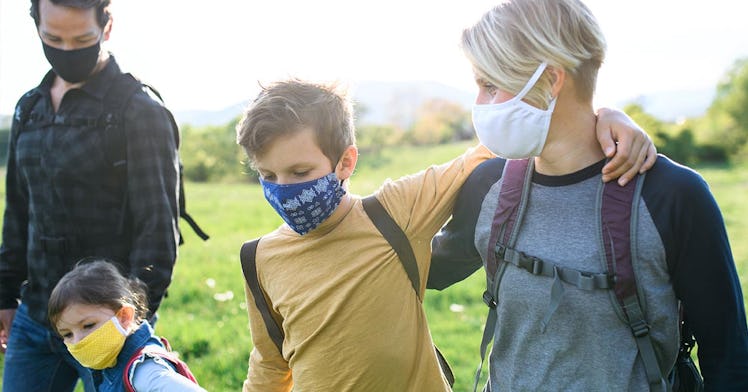These 5 Hacks Will Help You Determine If Your N95 Masks Are Counterfeit
Are your N95 or KN95's counterfeit? Here's how to tell.

Whether you’re wearing cute, personalized cloth or surgical masks now that we’re really in the swing of Covid times or hardcore N95 or KN95 masks, in many places around the country, they’re more or less a standard part of public life. But even though masks have gone from hospital blue and uniform to straight-up accessories, those sparkly, printed masks are unfortunately not nearly as effective as their more utilitarian N95 cousins. And at this point, when Omicron has turned cloth face masks into “little more than face decorations,” beefing up your mask supply with N95 and KN95 masks.
Indeed, N95 masks are the gold standard for particle filtering and are far safer than surgical or cloth masks, no matter how cute they are. The 95 in the name actually refers to the fact that N95 masks are proven to filter up to 95% of all particles in the air. But even though N95 and KN95’s are the best masks to get at the moment, not all of them are created, or manufactured, equally. And some of them are even fraudulent. Here’s what to know.
How to Choose a Mask
When choosing your mask, it’s important to focus on how the mask conforms to your face and what it’s made of, according to Dr. Darrien Sutton on Good Morning America. “When I’m thinking about wearing a mask, I’m thinking about two main qualities—the fit and the material,” Sutton explained on Good Morning America. “N95 masks are made out of this polymer-like substance that doesn’t allow the flow of pathogens…and it fits snug on the face.”
Sutton explained that cloth masks allow more particles to pass through and be inhaled by the wearer. Surgical masks are made of the same type of polymer material as N95s, said Sutton, but they don’t fit as well and the gaps allow particles and potential pathogens to enter the respiratory tract.
One problem we’ve seen with N95s though (and with their Chinese counterparts, the KN95 mask), is that there is a glut of counterfeit products on the market. Knowing how to spot them is important.
First, The Problem: Counterfeit Masks Are Rampant
Counterfeit N95 masks have been a problem since the pandemic began. In September 2020, the Emergency Care Research Institute reported that as much as 70% of Chinese N95 masks didn’t meet minimum standards. Later that same year, certain federal agencies seized millions of counterfeit N95 masks and in 2021, 2 million counterfeit masks that had been purchased and put into use by a hospital system in Portland, Maine were seized.
Then, The Solution: How to Spot a Counterfeit Mask
It may seem daunting to know that there’s a glut of counterfeit masks on the market. After all, you just want to do the right thing and stay safe, right? But the risk of purchasing fake masks and inadvertently putting yourself or others at risk for Covid is definitely discouraging. But luckily, there are a few telltale signs that your mask is legit (or not):
- NIOSH Certification: N95 masks are certified by the National Institute for Occupational Safety and Health. According to the CDC, if your N95 is legit, it will have an approval label on the packaging and on the mask itself. Even though NIOSH went so far as to have its approval label copyrighted, some counterfeits may still sneak by. To check that your NIOSH-approved N95 is actually NIOSH approved, you can check your serial number on the NIOSH Certified Equipment List (CEL) or the NIOSH Trusted-Source page.
- GB marking: Chinese-made masks made after July 1, 2021, are required to have the serial number GB2626-2019 stamped on the mask itself. This mark shows that the mask was manufactured according to newer Chinese safety standards. If your KN95 masks are printed with the number 2006 instead of 2019, you can continue to wear them as long as the expiration date has not passed. Still, note that they were manufactured before current standards were mandated.
- Check for branding on the mask and/or packaging. A lack of branding is a red flag that your N95 might be fake.
- Watch for FDA approval: Any N95 or KN95 that says it’s FDA-approved is not legit. The FDA does not play a role in mask approval—that’s all on the shoulders of NIOSH.
- Claims that the mask is approved for children. According to the CDC, “NIOSH does not approve any type of respiratory protection for children.”
While it is certainly disheartening that such steps are necessary, NIOSH has made it relatively simple to confirm whether or not your N95 is legit. Unfortunately, there’s really not much recourse you can take if you’ve purchased counterfeit masks except to toss them and make a new purchase, confident that you now know what to look for.
This article was originally published on